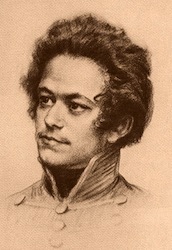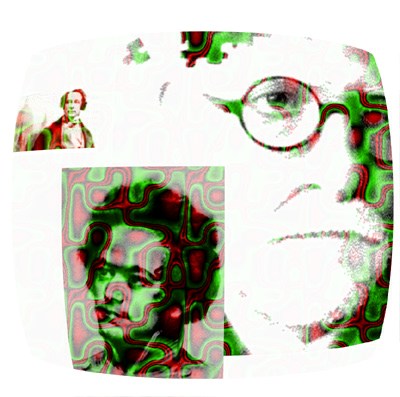



Comparative
Literature 577 • Fall 1999
William
A. Nericcio
It is an odd and remarkable cocktail party of sorts--our seminar, that is. With three guests of honor from three different nations speaking three different languages. From the Republic of Literature enters one bold and garrulous novelist, Charles Dickens. The Nation of Political Economy sends its infamous chronicler of systemic alienation and worker exploitation--a man most famous, perhaps, for having exposed the hypocrisy of Capital’s faith in motivated self-interest: Karl Marx. Last but not least, the fecund United States of Psychoanalysis have dispatched their very pater familias, that unassuming consumer of cigars, antiquities and reverie, Sigmund Freud. We are the hosts for this gala having set the stage for the momentous encounter of these three talented representatives of three disparate lands. And very soon we will see that their languages present no problem, for them or for us; rather than see ourselves as the creators of some festive new Babel, we will find instead to have constructed a context for new and innovative exegetic and theoretical exchange: instead of conflict, our guests will indulge in public reciprocation, evocative and clandestine semantic intercourse. And masters of ceremonies for this affair, we are not without our selfishness; we have some intrigue of our own: voyeurs of a sort, we will watch and listen for all manner of unforeseen exposures. Fasten your seatbelts, it promises to be one hell of a party. Note: unless otherwise noted, it is highly recommended that you purchase the editions of the book presently available at the Campus Bookstore run with Bounderby-like precision by the Capitalists at Aztec Shops. The Broadview Press edition of Charles Dickens’s Hard Times: For These Times; the Oxford Illustrated Dickens edition of Charles Dickens’s Dealings With the Firm of Dombey and Son Wholesale, Retail, and For Exportation (With Forty Illustrations by Phiz); Any edition of the Ben Fowkes translation of Karl Marx’s Capital: Volume 1; and last but not least, the Avon OR Bard edition of the James Strachey translation of Sigmund Freud’s Interpretation of Dreams. Attendance and Preparation Each seminar you will be expected to enter the seminar room having diligently completed and feverishly analyzed the assigned reading for that day. As you read, take the time to write down the discussion questions you would like to see addressed during the seminar. This is OUR seminar, not MY podium; our group will only be as good and as adventurous as YOU and I have the courage to imagine. We are, in this context, to be devotees of what Friedrich Nietzsche termed play, which is nothing more or less than play, as you presently understand it plus a rigorous, skeptical and irreverent irony and invention not always associated with that diversionary concept. In addition, it will be useful for you to keep a small diary beside your bed wherein to record fragments or, if you are lucky, narrative passages of your dreams. This is not to be turned in, it is only meant to add to your enjoyment and understanding of Freud’s work. If you want to start up a corporation to understand Marx on Capital and write 1000 page, three volume novels to recreate Dickens’s world view as well, you are welcome to do it, though again, you are by no means compelled to ever turn them in. Graded Assignments There will be from time to time, short one page Speculation Fragment assignments given throughout the semester--anywhere from one to three of these will appear at some time. The main writing for the course, however, is a ten to fifteen critical, analytical and/or speculative essay, wherein you will attempt to synthesize comparatively some aspect of Dickens, Marx AND Freud’s writing. Later in the semester I will hand you suggestions for this essay, but they are mere SUGGESTIONS. I would much rather you design your own thesis to explore. A one page proposal describing your speculative project is due October 22; the essay itself is due Tuesday December 7,the last day of class where we will share our conclusions and our work with each other for the last time. Office Hours I look forward to meeting and talking with you outside our seminar during office hours. My office is located in the utmost reaches of that epitome of Utilitarian ugliness, Adams Humanities 4117. I keep my regular office hours on Tuesdays from 11:15 to 2:00 and my phone number is 594.1524. My eMail address is memo@sdsu.edu. Grading We will run our weekly "cocktail party" as a seminar; as such there will be NO FINAL EXAM and your grade will be determined by your contributions to the seminar (35%), your brief speculation fragments (25%) and your seminar paper (40%). |
| cool
interview with marx
INTERVIEW WITH KARL MARX by H. The Chicago Tribune, January 5 1879 http://www.marxists.org/archive/marx/bio/media/marx/79_01_05.htm London,
December 18 [1878] -- In a little villa at Haverstock Hill, the
Your correspondent
has called upon him twice or thrice, and each time the
Perhaps
Dr. Karl Marx is better known in America as the author of Capital,
The
General Council comprises the following: R. Applegarth, M.T. Boon, Frederick
Bradnick, G.H.
During my
visit to Dr. Marx, I alluded to the platform given by J.C.
Volunteered Correction which I append as he dictated: First: Universal,
direct, and secret suffrage for all males over twenty
A Twelfth
Clause
"When the
reunion took place at Gotha, in 1875, there existed a division
"But," I
said, "socialists generally look upon the transformation of the
"Yes; we
say that this will be the outcome of the movement, but it will be a
"This platform,"
I remarked, "applies only to Germany and one or two other
"Ah!" he
returned, "if you draw your conclusions from nothing but this, you
"And that is the supremacy of labor?" "That is the Emancipation of Labor" "Do European socialists look upon the movement in America as a serious one?" "Yes: it
is the natural outcome of the country's development. It has been
"Now," asked your correspondent, "what has socialism done so far?" "Two things,"
he returned. "Socialists have shown the general universal
The Cosmopolitan Chapter in one word
-- and consequently tried to bring about an understanding
"Which means the overthrowing of the present social system," I interrupted. "This system
of land and capital in the hands of employers, on the one
I asked
him to give me a reason for the rapid growth of the socialistic
Independent Political Party They had
their own representatives in the German parliament. There was no
I asked
him a question regarding the numerical strength of the Lassallians
"The party
of Lassalle," he replied, "does not exist. Of course there are
"You would call it his nostrum?" "Exactly.
He called upon Bismarck, told him what he designed, and Bismarck
"What was his object?" "He wished
to use the working classes as a set-off against the middle
"It is said
that you are the head and front of socialism, Doctor, and from
The old gentleman smiled: "I know it. It Is Very Absurd yet it has
a comic side. For two months previous to the attempt of Hoedel,
"But your International Society in London directs the movement?" "The International
Society has outlived its usefulness and exists no longer.
"You are
your followers, Dr. Marx, have been credited with all sorts of
"We know,"
he replied after a moment's hesitation, "that violent measures
Religion Will Disappear Its disappearance
must be done by social development, in which education
"The Reverend Joseph Cook, of Boston -- you know him --" "We have
heard of him, a very badly informed man upon the subject of
"In a lecture
lately upon the subject, he said, 'Karl Marx is credited now
"No socialist,"
remarked the Doctor, smiling, "need predict that there will
But By a Nation" "The reverend
gentleman alluded to," I remarked, "gave an extract from a
"I never wrote a word of it. I never write Such Melodramatic Nonsense I am very
careful what I do write. That was put in Le Figaro, over my
"But you have written in sympathy with the Paris Communists?" "Certainly
I have, in consideration of what was written of them in leading
"Well, then,
to carry out the principles of socialism do its believers
"No great movement," Karl answered, "has ever been inaugurated Without Bloodshed The independence
of America was won by bloodshed, napoleon captured France
I asked Dr. Marx What He Thought of Bismarck He replied
that "Napoleon was considered a genius until he fell; then he was
To Create an Emeute" "You have continual advice from Berlin?" "Yes," he
said; "my friends keep me well advised. It is in a perfectly quiet
KARL
MARX by JOHN SWINTON
One of the
most remarkable men of the day, who has played an inscrutable but
The afternoon
is waning toward the twilight of an English summer evening as
At first
it seemed as though I had heard the echo of despair; but,
- 30 - |
| Day
to Day Menu of Assignments
Tuesday, Aug. 31 Dickens, Marx and Freud: an introduction All is a blur. Tuesday, Sept. 7 Writing Break, NO CLASS Tuesday, Sept. 14 Read Dickens’s Hard Times. Keep a keen eye out for passages that anticipate our encounter with Marx and Freud in the coming weeks--attend to stories of political economy and the unconscious that Dickens broaches in his own inimitable fashion. Tuesday, Sept. 21 Reading really gets good this week as we test the comparative premise of the class; please do pace yourself as it will be relatively easy to burn out. Dickens: Read to page 61 in Dombey and Son. Marx 125 to 177; avoid the Mandel preface for now and read Marx’s prefaces only if you must for the moment. Freud: Read pages 35 to 127 from The Interpretation of Dreams--do not read Freud’s prefaces, save perhaps the first (xxiii-xxiv) until AFTER you complete your reading, if at all; it is not mandatory; Read Strachey’s editorial introduction AFTER as well. You may read in ANY order you wish. Above all, have fun and don’t tax yourself as much with what you don’t understand; concentrate on what you are discovering. When you finish the three bits of reading; sit down and type a one page, double-spaced response to this prompt: "The most striking connection between Dickens, Marx and Freud in this week’s trialogue concerns the idea of _______________" Tuesday, Sept. 28 Dickens: Read to page 135, the end of chapter X. Marx: devour 178-244-->keep an eye on Marx’s footnotes: some of his most interesting work goes on here beneath the surface (this is true of Freud as well, speaking of whom...) Freud: eat up pages 128 to 195. In the reading for this week please do note the metaphors each author employs; are there particular overlaps that seem to transcend coincidence; are their rhetorical or figurative practices in Europe that transcend national and linguistic boundaries and that operate at the level of ideology? Tuesday, Oct. 5 Dickens: get down with 136 to 205 in Dombey; luxuriate in the sensual verbosity of this narrative fabulist. Marx: dive into pages 247 to 280...few pages, but dense ones. Break out the calculator and go to it...even Marx’s math is alluring. Freud: pages 196 to the middle of 253 are your home this week in Freud’s house. When you finish the three bits of reading; sit down and type a one page double-spaced response to this prompt: "The most striking difference between Dickens, Marx and Freud in this week’s trialogue is _______________" Tuesday, Oct. 12 Dickens: luxuriate in page 206 to 285--keep a keen eye out for metaphorical shifts or general narratalogical tactical oscillations. Marx: pages 281 to 339 are your home this week: beware the specter of the theory of SURPLUS VALUE; an encounter with these pages has augured the downfall of many a good Marxist fetishist in the past. Freud: pages 253 to 310 Tuesday, Oct. 19 Dickens: 286 to352 provide you with something to do between your Halloween costume shopping outings. Marx: 340 to 426, have fun watching how Capitalist’s profit off HANDS. Freud: 311 to 439: A huge, but crucial chunk of reading as you delve into the peculiarities and particularities of what Freud termed the DREAMWORK. Tuesday, Oct. 26 Dickens: 353 to 419--read on! Marx: aaaaaaaaaaaagggghhhh relative surplus value; no sweat, just keep an eye out for Marx’s own modulations as he writes: pages 429 to 491 Freud: 440 to 496--note how an encounter with political economy infects your reading psychoanalytic approaches to dreams; note as well how your dreams begin to inflect your understanding of economics. Your semester essay proposal is due today. Tuesday, Nov. 2 Dickens: pages 420 to 531 keep you busy this week. Marx: brace yourself-->pp 492 to 639 are your Marxist home for the week--a huge chunk of reading!!!!!!! But it will assist you as you read to keep the specter of Coketown before your eyes. Freud: 497 to 525 are where you will lurk for this week’s seminar--only a few pages, but rich ones as well (also, a good chance to catch up in Freud if you are behind). Tuesday, Nov. 9 Dickens: pages 531 to 603 give you something to chew on as we begin the homestretch. Marx: pages 643 to 706 not too many pages, but all too much you may imagine as you plunge into these! Freud: pages 526 to 611, Secondary Revision and Modified Wish-Fulfilments fills your plate. Tuesday, Nov. 16 Dickens: pp.604 to 738 are your pages of delight this week; pace yourself, this will be a tough week. Marx: pp.709 to 828, again, think of this as hell week. But cherish the rich mind of this singular 19th century philosopher. Freud: Read from 612 "Arousal From Dreams" to 664. Carefully note how Freud executes his volume’s closure--might we speak of a "logic of denouement"? Guess what? We’re done with Freud...reading at least Tuesday, Nov. 22 Dickens: read pages 739 to 827. Look closely as you read, as you did with Freud, at the way Dickens brings his opus to a close. Marx: read pages 828 to 907. Freud: Look back through your reading notes and begin to identify the sequences in the work that need closer examination but have been ignored. Tuesday, Nov. 30 Dickens: Finish the novel. Marx: Read to 940. You are done. Read the Mandel intro if you really must, but it is not required. Freud: Have a dream that features Freud and yourself in a romantic context. Tuesday, Dec. 7 No reading--essays presentations and essays due today. A Party as Well!!!! Freud, Dickens and Marx and their friends are invited. |
| essay
1 assignment
Critical/Analytical/Speculative Essay Assignment A 10 to 15 page essay due Tuesday December 7 in class (nota bene: this is our actual Seminar day when we will share our work on Charles Dickens, Karl Marx and Sigmund Freud with all our fellow cultural workers. Do take care to prepare and pace yourself so that your work and yourself arrive that day well rested and on time. The essay should not be more than 15 pages in length, double-spaced typing throughout with one-inch margins on the top, bottom and sides. Do not use anything smaller than a 12 point font as I am rather infatuated with my visual skills and would be content to slow their inevitable deteriorization. Please do proofread your writing carefully. With regard to formatting niceties, you are free to use either the MLA or the University of Chicago citation stylesheets--though let me add here in writing you are under no pressure to solicit secondary research materials in composing your opus. Possible Essay Topics: 1. Design your own thesis; one-page typed thesis proposal due TUESDAY OCTOBER 26 IN CLASS. 2. Much time has been spent in class attending to the metaphorical worlds Dickens, Marx and Freud weave in and through their works. Identify a dominant metaphorical chain that exists in all three books and explore how they relate to each other--even where authors use the same metaphor they may not use it to the same end. 3. Without question Dickens and Marx may be seen in their works to be redefining the domain of "political economy," understood here as "that branch of political science or philosophy which treats of the sources, and methods of production and preservation, of the material wealth and prosperity of nations." But in an odd and sometimes surprising way, Sigmund Freud as well may be understood to be concerned with articulating an "economy" as well, even if only a libidinal one. Explore the role of economics in Dickens, Marx and Freud. 4. Probe the role of desire in the works of Dickens, Marx and Freud. 5. Highlight the role of comedy in the works of Dickens, Marx and Freud. 6. Can it be argued that Dickens, Marx and Freud rethink the boundaries of their respective intellectual disciplines? 7. Consulting primary biographical material (letters, contemporary reviews, diaries etc), describe the connection between work and life impacting upon the rhetorical course of development of Dombey and Son, Capital I, and The Interpretation of Dreams. |
William
A. Nericcio
Associate
Professor
Department
of English & Comparative Literature
San
Diego State University
5500
Campanile Drive
San
Diego, California 92182-8140
619.594.1524
(phone )
memo@sdsu.edu